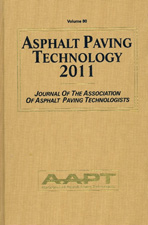DEStech Publications, Inc. announces the publication of Asphalt Paving Technology 2011, edited by Dr. Eugene Skok.
This volume, in both print and electronic (CD-ROM) form, comprises original and never-before published research on asphalt paving, including sustainable mix formulations (with recycled asphalt and shingle content), binder performance, data on cracking and wear, as well as novel testing protocols emerging from the "Guide for the Mechanistic and Empirical Design of New and Rehabilitated Pavement" (MEPDG). The technical information in the book was presented at the annual meeting of the Association for Asphalt Paving Technologists.
 Asphalt Paving Technology 2011
Asphalt Paving Technology 2011
Some of the highlights of the book include:
- New advances in hot- and warm-mix formulations and processing
- Recent test protocols and evaluation data for asphalt wear
- Performance data for asphalt with recycled content
- Accompanying CD contains all text, fully-searchable
Table of contents
- Practical implementation of intelligent compaction technology in hot mix asphalt pavements.
- Mechanistic characterization of aggregate packing to assess gyration levels during HMA mix design.
- Effect on dynamic modulus measurement protocol on predicted pavement performance.
- Evaluation of the MEPDG using asphalt material inputs obtained from plant mix.
- Correlating laboratory fatigue endurance limits to field-measured strains.
- The role of fillers on cracking behavior of mastics and asphalt mixtures.
- Low-temperature fracture evaluation of asphalt mixtures using mechanical testing and acoustic emissions techniques.
- Laboratory evaluation of asphalt mixtures containing sustainable technologies.
- Top-down cracking: enhanced performance model and improved understanding of mechanisms.
- Prediction of tire pavement contact stresses and analysis of asphalt pavement responses: a decoupled approach.
- Uniaxial nonlinear viscoelastic constitutive model for asphalt concrete.
- RAP or RAS? The differences in performance of HMA containing reclaimed asphalt pavement and reclaimed asphalt shingles.
- Laboratory evaluation of field-produced hot mix asphalt containing post-consumer recycled asphalt shingles and fractionated recycled asphalt pavement.
- Performance of high RAP-WMA surface mixtures.
- Impacts of WMA production temperatures on binder aging and mixture flow number.
- Moisture damage characteristics of warm-mix asphalt mixtures.
- Effect of oxidative aging on binder fatigue performance.
- Analogical-based approach to forward and inverse problems for asphalt materials characterization at low-temperatures.
- Low-temperature cracking characterization of asphalt binders by means of the single-edge notch binding (SENB) test.
- Evaluation of the relationship between asphalt binder properties and non-load-related cracking.
- Performance evaluation of terminal blend tire rubber HMA and WMA mixtures - case studies.